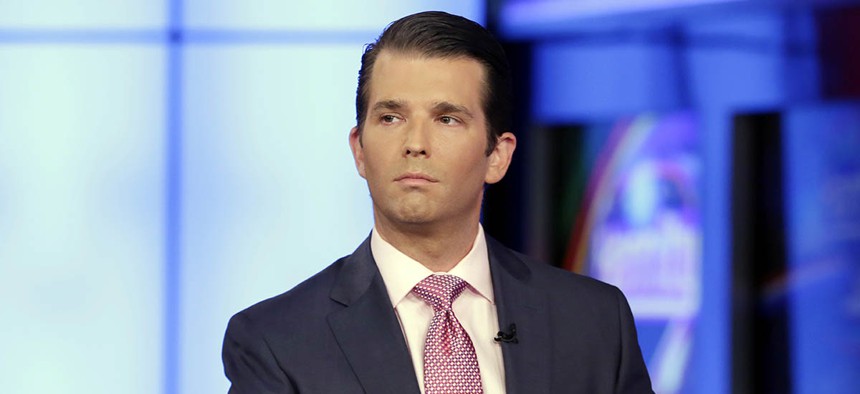But His Emails!

Donald Trump Jr. Richard Drew/AP
The latest White House scandal brings the nation’s attention back to the inbox.
Nothing like a presidential scandal to turn something utterly mundane into a national obsession. But here we are, once again, talking about emails.
The emails. Oh, the emails!
During the 2016 presidential campaign, email became a symbol of Hillary Clinton’s alleged corruption. Clinton’s aides wiped about 33,000 emails from a private server she used during her time as secretary of state, and Donald Trump made the deletions a cornerstone of his campaign against her.
“How can anyone vote for Hillary when she careless with emails that jeopardize our security,” he tweeted in September 2015. “She is not to be trusted.”
Then, in June 2016: “How can Hillary run the economy when she can't even send emails without putting entire nation at risk?” And also: “One of the reasons Hillary hid her emails was so the public wouldn't see how she got rich- selling out America.”
A year later, in July 2016: “If Russia or any other country or person has Hillary Clinton's 33,000 illegally deleted emails, perhaps they should share them with the FBI!”
That last one still raises an eyebrow. Especially today. What the American people didn’t know at the time, and what we know now, is that Trump’s son, Donald Trump Jr., had been doing some scandalous emailing of his own related to Russia.
On June 3, 2016, Trump Jr. received an email from Rob Goldstone, a Trump associate, former tabloid reporter, and entertainment publicist. Goldstone promised information that “would incriminate Hillary and her dealings with Russia and would be very useful to your father.” The New York Times on Tuesday first reported the contents of the email exchange, which Trump Jr. also released on Twitter. “This is obviously very high level and sensitive information but is part of Russia and its government’s support for Mr. Trump,” Goldstone had written. Trump Jr. replied: “If it’s what you say I love it especially later in the summer.” (You can read a transcript of the entire exchange here.)
In an earlier era, this sort of exchange might have taken place over the phone, or via telegram, or, you know, face to face. So it makes sense the scandal of the moment is tied to a ubiquitous form of communication. Especially when that form of communication is so easily forwarded, or copied, or hacked. Given it was the utter carelessness Donald Trump seemed to find most offensive about Clinton’s use of a private server, one can only imagine the conversation he’s having with his son today. This scandal isn’t really about email, after all; it’s about how Trump Jr. used it.
Clinton’s supporters have long cried, “but her emails!” as a way to minimize the Clinton email scandal in comparison and maximize Trump’s hypocrisies. Yes, Clinton should have known better than to use an outside server to conduct government business. But Trump Jr. is now learning a similarly rudimentary lesson. Email is not a secure way to communicate, but lots of people are sloppy with it anyway. The common-sense advice is this: Don’t write anything in an email you wouldn’t want to see on the front page of the newspaper tomorrow. (This is a thought exercise that no longer requires imagination for Trump Jr.)
“Part of the reason Donald Trump Jr. is finding himself in hot water right now is he forwarded an entire email chain,” said Amy Webb, the writer and founder of the Future Today Institute. “I can’t state that enough. Email is penetrable. Unless you are using a lockdown system and encryption, anybody can access it.”
The fact an email-centered scandal has boomeranged back to the Trump White House isn’t the only irony, Webb says, noting reports the White House has gutted its Office of Science and Technology Policy. (The White House disputes this characterization.)
“These are some fundamental misunderstandings by the people who are now deciding technology policy,” she said, “in the absence of real scientists and technologists who know what they’re doing.”
For many people, it’s not at all practical to avoid email entirely. And it’s arguably lucky for the American people that those in positions of power are sometimes careless. A paper trail, even a digital one, can reveal important information politicians would otherwise keep secret. But, as Trump Sr. once suggested, carelessness with something so simple as email is a red flag. A person who’d jeopardize security that way, he said, is “not to be trusted.”


